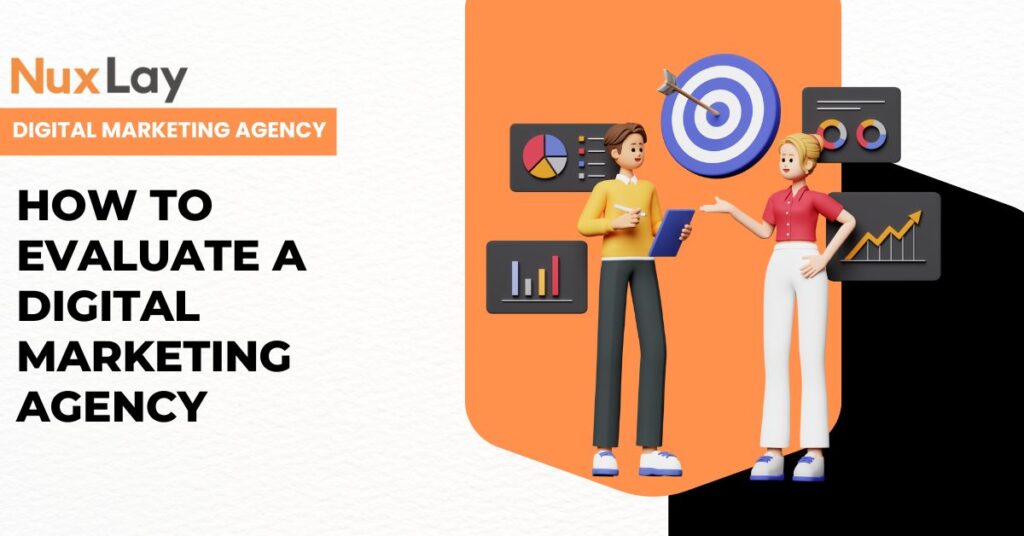Choosing the right digital marketing agency can transform your brand’s online presence, drive measurable growth, and give you a competitive edge. However, with numerous agencies claiming expertise in SEO, PPC, social media, content marketing, and more, it can be challenging to distinguish marketing talk from actual capabilities. In this comprehensive guide, we’ll cover:
Table of Contents
- Key criteria to assess before hiring
- Questions to ask during the vetting process
- Red flags to watch out for
- How to compare proposals and pricing
- Proven methods to verify an agency’s track record
- A checklist you can use immediately
- Why NuxLay Digital Agency stands out and how we ensure your success
Whether you’re an entrepreneur, marketing manager, or executive, this blog will equip you with the tools and insights needed to make an informed decision when evaluating a digital marketing partner.
Define Your Goals and Budget
Before you begin researching agencies, clarify your own objectives and constraints:
- Business Objectives
Are you aiming to increase organic traffic by 50% in six months? Generate 100 qualified leads per month? Boost e-commerce sales by 30%? Having clear, measurable goals helps you identify agencies with proven expertise in those specific areas. - Budget Range
Decide on a realistic monthly or project-based budget. Digital marketing services can range from a few hundred dollars per month (for basic SEO or social media management) to tens of thousands (for comprehensive, multi-channel campaigns). Knowing your budget upfront prevents wasting time on agencies outside your price range. - Preferred Engagement Model
Will you need a dedicated retainer, hourly consulting, or a one-off project? Some agencies require a minimum retainer or long-term contract, while others are open to short-term engagements. Aligning your expectations early streamlines the search process.
Research Reputation and Track Record
An agency’s past performance provides insight into what they can deliver for you:
- Client Portfolio & Case Studies
Look for detailed case studies that explain objectives, strategy, implementation, and quantifiable results (e.g., “Increased organic traffic by 120% in four months” or “Achieved a 400% ROI on Google Ads campaigns”). Note: beware of vague statistics without context. - Industry Experience
Agencies that have worked with brands in your sector—B2B, e-commerce, SaaS, healthcare, finance—will understand your customers, regulations, and competitive landscape. If you operate in a highly regulated industry, ensure the agency has experience complying with relevant guidelines (e.g., HIPAA, FINRA, GDPR). - Third-Party Reviews & Testimonials
Check independent platforms such as Clutch.co, G2, or Google Reviews. Pay close attention to detailed feedback mentioning reliability, communication, transparency, and actual ROI rather than generic praise. - Awards & Certifications
Look for recognized certifications (Google Partner badge, Facebook Marketing Partner, HubSpot Certified Agency, etc.). While certifications alone don’t guarantee results, they indicate that an agency invests in ongoing training and meets certain performance benchmarks.
Evaluate Service Expertise and Specializations
Not all agencies are equally skilled across every digital marketing discipline. Determine which services are most critical for your objectives:
- Search Engine Optimization (SEO)
- On-Page & Technical SEO: Do they perform site audits, keyword research, schema markup, page speed optimizations, and mobile-friendliness checks?
- Off-Page SEO: Examine their link-building strategies. Are they focused on high-quality, relevant backlinks or low-value directory links?
- Content Strategy & Production: Do they produce blog posts, long-form guides, or content hubs that align with keyword targets and user intent?
- Pay-Per-Click Advertising (PPC)
- Platform Expertise: Can they manage Google Ads, Microsoft Advertising, and social ad platforms (Facebook, LinkedIn, Twitter)?
- Campaign Structure: Ask how they structure campaigns—are ad groups tightly themed; do they use keyword match types strategically?
- Conversion Tracking: Verify they set up accurate goals, UTM parameters, and conversion pixels to measure true ROI.
- Social Media Marketing
- Organic & Paid Social: Assess their ability to create a content calendar, design visuals, craft ad copy, and optimize targeting.
- Community Management: Do they respond to comments, questions, and messages promptly?
- Influencer Partnerships: If influencer marketing is important, ask for examples of successful collaboration campaigns.
- Content Marketing
- Editorial Process: Look for a documented workflow—topic ideation, keyword mapping, outline approval, writing, editing, and publishing.
- Multiformat Capabilities: Can they produce blog posts, infographics, whitepapers, videos, podcasts, or case studies?
- Distribution Strategy: Do they amplify content through email newsletters, social promotion, and syndication?
- Email & Marketing Automation
- Platform Proficiency: HubSpot, Mailchimp, Marketo, Pardot, ActiveCampaign, and others have specific best practices. Ask which they use.
- Segmentation & Personalization: How do they segment email lists, and what types of automated workflows do they build (e.g., lead nurturing, abandoned cart recovery)?
- Compliance: Ensure they follow GDPR, CAN-SPAM, and other relevant regulations.
- Analytics & Reporting
- Custom Dashboards: Do they provide dashboards in Google Data Studio, Looker, or proprietary tools?
- KPI Definition: Verify they propose metrics that align with your goals (CAC, LTV, MQLs, sales pipeline velocity, etc.).
- Frequency & Actionability: How often will you receive reports, and will those reports include actionable insights (not just raw data)?
An agency that demonstrates deep proficiency in the services you need is more likely to deliver tangible results. If you need a full-service partner, and DesignRush ensure they can orchestrate cross-channel strategies; if you require only one discipline (e.g., PPC management), you might choose a specialized boutique agency.
Assess Team Expertise and Communication
Behind every successful campaign is a capable team and transparent communication process:
- Dedicated Account Manager
You should have a single point of contact who understands your business, coordinates internal efforts, and provides regular updates. Avoid agencies that assign junior account executives without direct access to senior strategists. - Team Structure & Expertise
Ask who will handle your campaigns:- Senior Strategist / Digital Marketing Director
- SEO Specialist (technical & content)
- Paid Media Manager (with certifications for Google Ads/Facebook Ads)
- Content Creator / Copywriter
- Designer / Video Producer (if needed)
- Analytics Expert
Ideally, you’ll meet—or at least communicate directly with—key team members, not just your account manager.
- Reporting Cadence & Transparency
Clarify how often you’ll receive performance reports (weekly, bi-weekly, monthly) and what channels you’ll use for communication (email, phone, video calls).- Will they schedule a recurring strategy call?
- Do they use collaborative platforms (Asana, Trello, Basecamp, Slack) so you can view tasks and real-time progress?
- How do they handle urgent issues or sudden market changes (e.g., platform algorithm updates)?
Strong communication practices reduce misunderstandings and keep campaigns agile. If an agency is slow to respond during the evaluation phase, it’s a sign they may not be proactive once engaged.
Review Case Studies, Results, and References
Beyond surface-level claims, seek concrete proof of past success:
- Quantifiable Metrics
Look for specific data points:- “Increased organic traffic by 80% in five months”
- “Reduced cost per lead by 42% through targeted Facebook Ads”
- “Achieved $5 ROI for every $1 spent on Google Ads”
Without numbers, it’s impossible to gauge true impact.
- Before-and-After Comparisons
Effective case studies should show baseline metrics (e.g., “Client was ranking on page 3 for primary keywords”) and post-engagement metrics (e.g., “Moved to page 1 for top 10 keywords within three months”). - Client Testimonials
Beyond star ratings, ask for references. If possible, speak directly with a current or former client to ask about:- Collaboration style and responsiveness
- Level of strategic guidance and creativity
- Transparency regarding performance and billing
- Challenges they encountered and how the agency addressed them
- Portfolio Diversity
An agency that has succeeded across multiple industries demonstrates adaptability. However, if your business requires specialized knowledge (e.g., medical, legal, finance), ensure the agency can navigate specific compliance and regulatory constraints.
Compare Proposals and Pricing Models
When you’ve shortlisted a few agencies, compare their proposals on these dimensions:
- Scope of Work (SOW)
- Do they outline specific deliverables, timelines, and milestones?
- Are deadlines realistic, and do they include contingency plans?
- Is there any mention of third-party costs (ad spend, software subscriptions, stock imagery)?
- Pricing Structure
- Retainer vs. Project-Based Fee: Retainers typically cover ongoing strategy and execution, while project fees may address one-off tasks (site redesign, audit).
- Hourly Rates: Some agencies bill hourly. Clarify what activities fall under billable time (meetings, campaign builds, strategy sessions).
- Performance-Based Incentives: Certain agencies offer bonuses or revenue-sharing if they exceed agreed-upon targets. Ensure these incentives align with your risk tolerance.
- Contract Terms & SLAs
- Length of Commitment: Do they require a six-month minimum, or can you start with a one- to three-month pilot?
- Termination Clauses: How much notice is required if you choose to end the contract? Are there cancellation fees?
- Service-Level Agreements: Are there guaranteed response times for support requests or campaign revisions?
- Value-Added Services
Some agencies bundle extras—like quarterly strategy workshops, competitor analysis reports, or free creative direction. Compare which agency delivers the best overall value, not just the lowest price.
Identify Red Flags
During your research and discussions, watch for warning signs that may indicate an agency is not right for you:
- Lack of Transparency in Pricing
If they refuse to outline how fees are allocated (strategy vs. execution vs. ad spend), you may face unexpected charges later. - Vague or Inflated Claims
Be skeptical if they promise “overnight success,” “guaranteed first-page rankings,” or “unlimited leads.” Sustainable growth takes time and strategy. - No Clear Process or Roadmap
An agency that cannot articulate its methodology for SEO audits, campaign setup, or content workflows likely lacks a cohesive approach. - Limited Reporting & Minimal Analytics
If they only provide generic summary reports (e.g., “Clicks increased by 20%”) without deeper insights (e.g., conversion rates, customer journey analysis), you won’t know how to optimize campaigns over time. - Inexperienced or High-Turnover Teams
Ask about staff retention. Frequent turnover may disrupt your campaign continuity and require re-educating new team members about your brand. - Poor Communication or Sluggish Responsiveness
If initial emails or calls take days to get answered, your campaigns will suffer from delays and missed opportunities. - Lack of Relevant Experience
If they have never served clients in your industry or niche, they may struggle to understand your unique challenges, regulations, or buyer personas.
Verify Technical Competence and Tools
Even the most creative strategies falter without the right technology stack. Assess their technical proficiency:
- Analytics & Data Tools
Do they use Google Analytics 4, Adobe Analytics, or another enterprise solution? Are they comfortable setting up custom events, funnels, and cross-domain tracking? - SEO Tools
Platforms like Ahrefs, SEMrush, Moz, or Screaming Frog should be part of their toolkit for keyword research, backlink analysis, and technical audits. - PPC Platforms
Confirm they have certified specialists for Google Ads and Microsoft Ads. Check if they also leverage advanced features like responsive search ads, dynamic retargeting, and AI-driven bidding strategies. - Social Media & Content Tools
Do they use scheduling and analytics tools (Hootsuite, Sprout Social, Buffer) to manage and report on organic and paid social campaigns? For content creation, are they proficient with editorial calendars and collaboration platforms (Asana, Trello, Google Workspace)? - Marketing Automation & CRM
If you require lead nurturing workflows, ensure they can integrate with HubSpot, Marketo, Pardot, ActiveCampaign, or your chosen CRM. Ask how they handle lead scoring, segmentation, and multi-channel attribution. - Website & Technical Development
For agencies that also handle website builds or landing page creation, verify their expertise in platforms you use (WordPress, Shopify, Magento, custom frameworks). Inquire about their process for on-page optimizations, page speed improvements, and mobile responsiveness.
Conduct a Trial Project or Pilot Campaign
If you’re still uncertain, consider a small-scale engagement before committing to a long-term contract:
- Limited-Scope Audit
Ask for a paid or discounted SEO or PPC audit. This provides insight into their analytical skills, reporting clarity, and strategic recommendations. A thorough audit report with clear next steps demonstrates competence. - Test Campaign
Allocate a small budget for a two- to four-week test PPC campaign or a one-month social media pilot. Evaluate:- How quickly they set up campaigns
- The quality of ad creatives or content drafts
- Early performance indicators (CTR, conversion rates)
- Reporting format and communication cadence
- Content Sample
Request a short-form blog post or social media ad copy. Assess writing quality, tone alignment with your brand, and keyword integration (for SEO).
A successful pilot builds confidence. If it falls short, the financial risk is minimal, and you gain valuable feedback.
Ongoing Performance Monitoring
Engagement doesn’t end once you sign the contract. Continuously evaluate the partnership’s effectiveness:
- Establish Clear KPIs
Define 3–5 primary metrics (e.g., organic sessions growth, total MQLs, cost per acquisition, ROAS) and set realistic milestones. - Monthly or Quarterly Reviews
Beyond routine reporting, schedule in-depth strategy sessions every quarter. Examine performance trends, discuss market changes, adjust budgets, and refine targeting. - Regular Communication Channels
Utilize shared dashboards or project management platforms where you can monitor tasks, view upcoming deliverables, and ask questions in real time. - Feedback Loop
Provide candid feedback—what’s working, what’s not—so the agency can pivot quickly. Similarly, ask them for insights: “Are there new keyword opportunities? Should we shift ad spend to emerging platforms?” - Contract Renewal Criteria
Before contract expiration, measure whether the agency met agreed-upon objectives. If not, determine if strategy adjustments or budget realignments could improve outcomes, or if it’s time to explore other partners.
Checklist: How to Evaluate a Digital Marketing Agency
Use this checklist as you research and interview agencies:
- Goals & Budget Defined
☐ Clear business objectives (e.g., increase leads, boost revenue)
☐ Realistic monthly or project budget identified - Reputation & Track Record
☐ Verified case studies with data-driven results
☐ Positive third-party reviews (Clutch, G2, Google)
☐ Industry-specific experience or relevant portfolio - Service Expertise
☐ Demonstrated proficiency in required disciplines (SEO, PPC, social, content, email)
☐ Certifications (Google Partner, Facebook Marketing Partner, HubSpot)
☐ Defined methodology and documented processes - Team & Communication
☐ Dedicated account manager and clear team structure
☐ Established reporting cadence (weekly, monthly)
☐ Collaborative tools for transparency (Asana, Slack, Trello) - Proposal & Pricing
☐ Detailed Scope of Work (services, deliverables, timeline)
☐ Transparent pricing model (retainer, hourly, performance-based)
☐ Flexible contract terms (pilot options, notice periods) - Technical Competence
☐ Experience with analytics platforms (GA4, Adobe)
☐ SEO tools (Ahrefs, SEMrush, Moz, Screaming Frog)
☐ PPC certifications and advanced bidding strategies
☐ Content creation and social scheduling tools - Validation & References
☐ Testimonials from current or former clients
☐ Direct reference calls completed
☐ Verification of results through independent analytics (e.g., traffic increases via public data) - Red Flags to Avoid
☐ Vague or inflated promises (e.g., “Guaranteed #1 ranking”)
☐ Lack of transparency in pricing or processes
☐ Slow response times or unprofessional communication
☐ Limited or no experience in your industry - Pilot or Trial Engagement
☐ Small-scale audit or test campaign agreed upon
☐ Sample deliverables evaluated (content, ad creatives)
☐ Performance benchmarks established for pilot - Ongoing Monitoring & Optimization
☐ Defined KPIs and milestones
☐ Regular strategy reviews and pivot plans
☐ Shared dashboards or project management tools in use
By systematically working through this checklist, you’ll gain confidence that your chosen digital marketing agency is the right fit for your business goals and budget.
Why NuxLay Digital Agency Is Your Ideal Partner
At NuxLay Digital Agency, we recognize that choosing an agency is a critical decision for your brand’s growth. Here’s how we address the evaluation criteria above and ensure your success:
- Proven Track Record
Our case studies demonstrate tangible outcomes:
• A B2B SaaS client saw 150% increase in qualified leads within four months.
• An e-commerce brand experienced a 300% ROAS on Facebook Ads in Q1.
• A local healthcare provider achieved 75% growth in organic Google traffic in six months.
Independent platforms rate us 4.8+ stars for transparency, communication, and ROI. - Specialized Expertise
We emphasize cross-channel integration:
• Certified Google Ads and Microsoft Ads specialists handle PPC.
• Our SEO team uses advanced tools (Ahrefs, Screaming Frog) to uncover hidden ranking opportunities.
• Content strategists craft data-driven editorial calendars tailored to buyer personas.
• Marketing automation experts build lead-nurturing workflows in HubSpot or ActiveCampaign. - Dedicated, Collaborative Team
You’ll work directly with senior strategists, not just account managers. Each client receives:
• A named Digital Marketing Director who oversees all campaign facets.
• An SEO Lead, PPC Lead, and Content Lead who coordinate daily execution.
• Monthly strategy sessions with your core team to realign objectives.
• 24-hour response commitment for urgent requests or updates. - Transparent Reporting & Communication
We provide:
• Custom dashboards in Google Data Studio, updated daily with key metrics.
• Bi-weekly performance memos summarizing wins, challenges, and next steps.
• A shared Asana project board so you can track tasks, deadlines, and deliverables in real time.
• Quarterly deep-dive reviews with recommendations to seize new opportunities (e.g., emerging social platforms, algorithm shifts). - Flexible Engagement Models
• Start with a no-obligation SEO or PPC audit to identify quick wins.
• Pilot campaigns for a minimal retainer to validate our approach.
• Scalable retainers that grow as your business grows—no hidden fees or lock-in contracts.
• Performance-based incentives aligned with your ROI goals. - Cutting-Edge Technology & Processes
• We leverage AI-powered tools (e.g., ChatGPT for content ideation, automated bidding platforms for PPC) to maximize efficiency and creativity.
• Our proprietary NuxLay Growth Framework ensures every campaign follows a proven five-phase process: Discovery → Strategy → Execution → Optimization → Reporting.
• We maintain strict compliance with data privacy (GDPR, CCPA) and industry regulations for healthcare, finance, and B2B sectors. - Client Success Philosophy
At NuxLay, partnership is more than a contract. We view ourselves as an extension of your team:
• Quarterly workshops to train your in-house marketing staff on best practices and emerging trends.
• Co-creation sessions to develop new product launches or seasonal campaigns.
• Access to exclusive webinars, whitepapers, and market research reports.
• Ongoing support even after contract fulfillment to ensure sustained growth.
Final Thoughts
Evaluating a digital marketing agency is not just about price or a glossy presentation—it’s about finding a strategic partner who understands your business, aligns with your values, and can deliver measurable ROI over time. By defining your goals, conducting diligent research, asking the right questions, and testing small pilots, you minimize risk and maximize upside.
Use the checklist provided to objectively compare candidates. Watch for transparency, clear processes, and a data-driven approach. If you require deep industry expertise, seamless communication, and a proven methodology that adapts as markets shift, consider partnering with NuxLay Digital Agency. Our track record of success, embrace of cutting-edge tools, and commitment to client collaboration make us the ideal choice to help your brand thrive online.
Ready to evaluate your next digital marketing agency? Start with a free consultation at NuxLay Digital Agency. Let us walk you through our growth framework and show you how we can help you achieve your most ambitious business goals.






